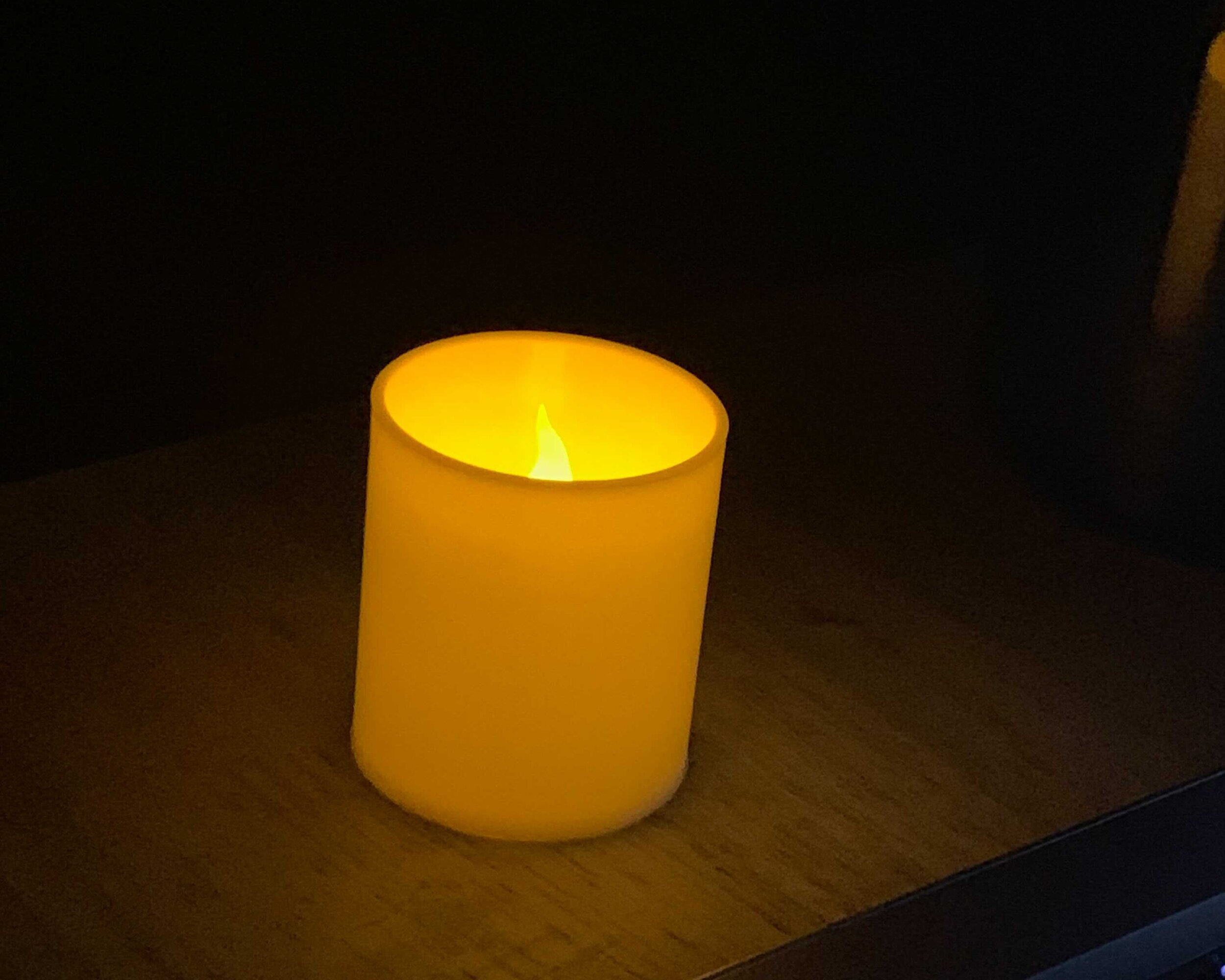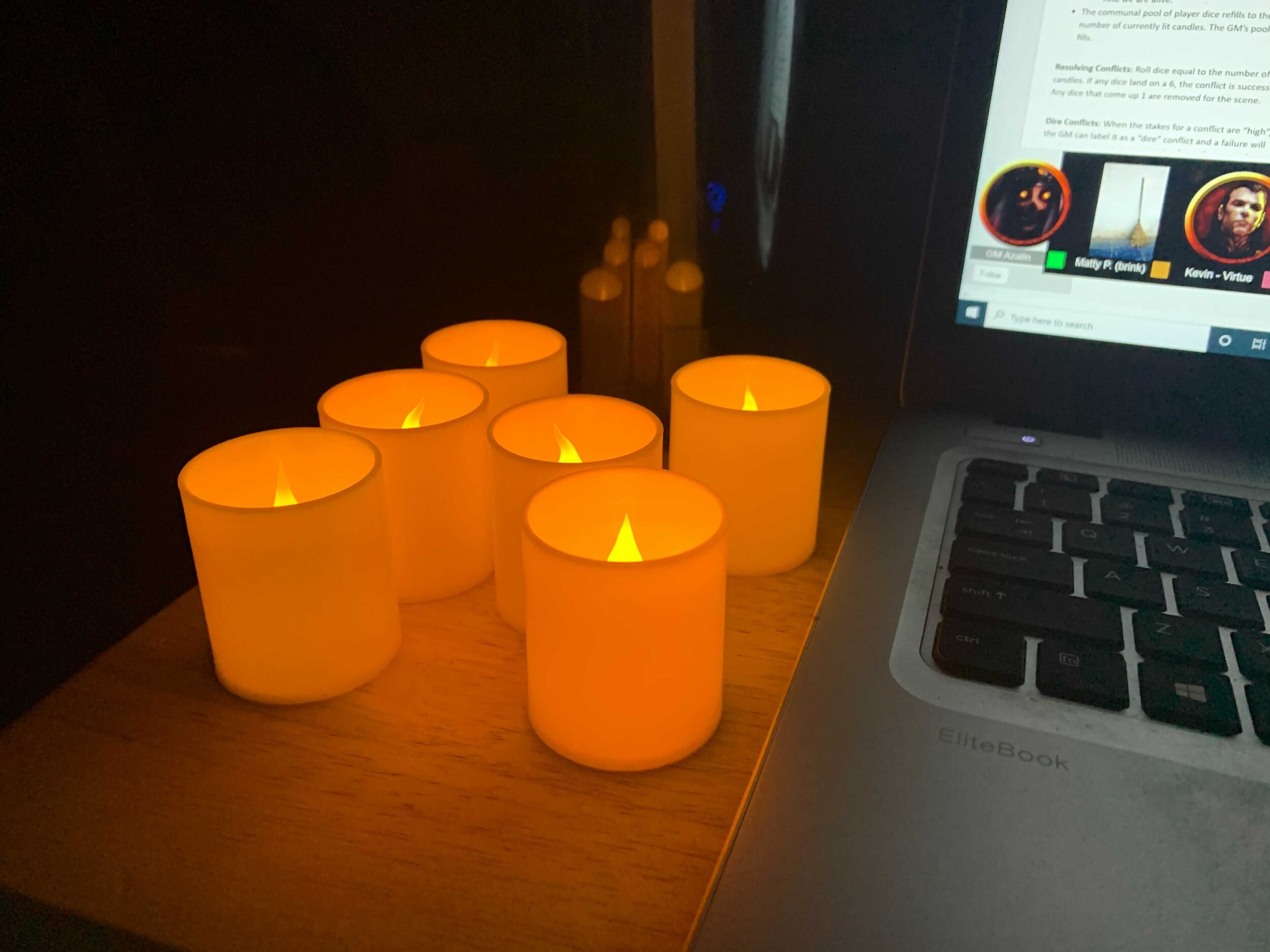Ten Candles, Horror Storytelling, and the Inevitability of Death
Jason Mical, Contributing Editor
I’m one of three people left alive, possibly the last three people on Earth. We don’t know. We have no way of knowing. We’re hunkered down in the town’s fallout shelter and our food just ran out. The sun is gone. Light is gone. Hope is gone. They are out there, and the only thing we know is that the now-missing light is what keeps them at bay. We have a handful of working flashlights, and ruling over this game are the titular 10 candles. As they slowly go out, so do we. This is how we die.
Ten Candles is a storytelling-horror tabletop RPG by Stephen Dewey. Originally kickstarted in 2015, it has become a staple of convention and one-shot play due to its quick nature (a game takes maybe 3-4 hours) and opportunities for intense collaborative storytelling. The key game mechanic is the 10 candles of the title, a means to track both time and entropy (you literally play with 10 lit candles on the table). I recently jumped at a chance to play an online game over Roll20, and dutifully supplied my own 10 candles in the darkened room in which I played. The result was a collaborative RPG experience unlike any other I’ve had, where the doomed group of survivors created the world that ultimately killed us.
The less you know about Ten Candles going in, the better, so I’m going to paint in broad strokes. The game is divided into a series of scenes, and when a scene is over, a candle goes out. When the last candle goes out, the game ends and everyone dies (just to set expectations accordingly). Character creation is quick and fun, with a series of defining qualities you sketch together that affect your gameplay and begin to define the world.
Then, it’s on to the first scene. The mechanics bake in several opportunities to continue to create the game world and to give your characters and group interesting things to do. The spirit of the game is a sense of doomed inevitability, so you’re discouraged from doing things like giving yourself superpowers! and encouraged to stick with giving yourself a gun with a single bullet. Conflicts are resolved by rolling d6s—as many as there are candles remaining. Any 6 on any die is a success. 1s can potentially be rerolled, but if you let them stand, those dice are removed from the pool for future rolls in that scene. The GM rolls against you. If they get the same or more 6s than you do, the GM narrates what happens. If they get a 6 and you do not, you fail and the scene ends. And when the scene ends, a candle (and d6) goes away—and the GM adds a d6 to their pool.
The horror included in the game’s mechanics comes from this slow, inevitable loss of resources (dice). As the physical candles go out and the dice disappear, it becomes harder and harder for the players to do anything—and easier for the GM to lead them to their doom. At first the horror creeps in. By the end of the game, it happens so quickly that the game feels like the third act of a particularly tense film.
The game is compact and meant to be played quickly, giving everyone an opportunity to participate in forging this shared experience, even as their deaths are inevitable. Ten Candles is a horror game and was meant to be played as such, though it would be an interesting exercise to adapt its mechanics to another, more hopeful endeavor. The storytelling mechanics are its true strength—you don’t even realize you’re worldbuilding until you’ve already been doing it. For such a compact game to pack such a powerful emotional and mechanical punch is quite a feat, and Ten Candles deserves every one of its lauds.
Our game did not end hopefully. It died in the snow in a Maine winter as the last survivor succumbed to Them. The entire session took about three hours with four players total, and I would guess adding one or two more might increase that to four hours, tops. As finite as it was, I can say I will absolutely play this game again.
Horror gaming isn’t for everyone. It’s a far cry from traditional hack-and-slash power fantasies, and there’s always a grim air of inevitability hanging over everything you do. Ten Candles takes this to its inevitable conclusion: everyone will die. The characters will lose. In this scenario, there is a freedom to cooperatively tell an amazing story, and make sure your end is memorable. Ten Candles gives you the mechanics to do just that in a compact, quick-playing package. Therein lies its genius.





